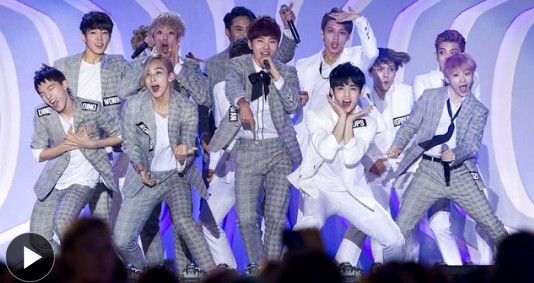
Behind the surprising world-wide spread of South Korean pop culture, from the TV drama ‘Descendants of the Sun’ in China to KCON fan conventions in the U.S., France and Abu Dhabi.
There may be no more unlikely pop-culture success in the world right now than South Korean hallyu—the umbrella term for K-pop music, TV dramas and movies, also known as the Korean Wave. The phenomenon has spread far from South Korea, with the most obvious manifestation this year in the U.S. coming at KCON pop concerts and fan conventions.
More than 50,000 fans, many if not most of them teenagers, are expected to attend the second East Coast KCON on June 24-25 at the Prudential Center in Newark, N.J.—where groups like BTS and Seventeen can expect a frenzied Beatles-at-Shea reception. Most tickets sold out the first day the box office opened. The Los Angeles KCON iteration (July 29-31 at Staples Center) has drawn about 50,000 attendees annually for the past few years. And the franchise has gone global: Paris and Abu Dhabi had their first KCONs this year. In Paris tickets sold out in the first three hours, according to promoters.
KCON in the U.S. is organized by CJ E&M America, part of the CJ Group, a Korean conglomerate. Angela Killoren, the chief operating officer of the company’s American outfit, tells me that only 10% of KCON attendees are of Korean descent and three-quarters of attendees are female.
Ms. Killoren says the North American KCONs right now are a break-even proposition: $10 million in revenues, $10 million in costs. So why bother? Her reply reflects a supremely Korean outlook: The company believes that KCON’s payoff lies in the intangible cross-pollination it provides to the overall Korean economic ecosystem—“It would be good for everyone. KCON allows smaller Korean companies to put their foot into the world and we are raising Korea’s brand value.” When do they expect big returns? “We’re looking at a very long-term forecast: 10 years, 20 years.”
An American company would probably cause a shareholder mutiny for saying it was fine with not turning over a significant profit for 40 to 80 quarters. But taking the long view has been a hallmark of South Korea’s climb from post-Korean War impoverishment to today’s market dynamism, which has been fueled over the years by an unusually close alliance between government and business.
Hallyu rose from the ashes of the Asian Financial Crisis of 1997-98, which crippled the economy and forced South Korea to come up with an export model based on something other than cars and electronics. If the new industry required little physical infrastructure and virtually no learning curve, so much the better—and thus the decision to export Korean pop culture.
It wasn’t the obvious move. The Korean language is basically spoken and understood only on the Korean Peninsula, so how much audience could there be for South Korean pop music and dramas? With businesses reluctant, the government in Seoul stepped in during the late 1990s, using public funds to translate Korean dramas into other languages and creating a $1.5 billion fund earmarked to develop and export Korean pop culture and other soft industries.
The public-private partnership paid off, and now companies like CJ are taking on the full load of promoting hallyu abroad, without government help. And foreign companies are getting in on the action: The 16-episode Korean drama “Descendants of the Sun,” a smash hit in South Korea and China since its February debut, was underwritten by $11 million from Chinese investors, according to Forbes.
As for K-pop, its often deliriously upbeat songs and elaborate dance routines—the boy groups and girl groups often number in double figures—isn’t for everyone, as even the South Korean government seems to acknowledge. Along the Demilitarized Zone, the government has been known to try to drive North Korean soldiers to distraction by blasting the music of Girls’ Generation and other K-pop stars through loudspeakers. A subgroup of Girls’ Generation will be performing at KCON in Los Angeles.
Ms. Hong is the author of “The Birth of Korean Cool: How One Nation Is Conquering the World Through Pop Culture” (Picador 2014).

